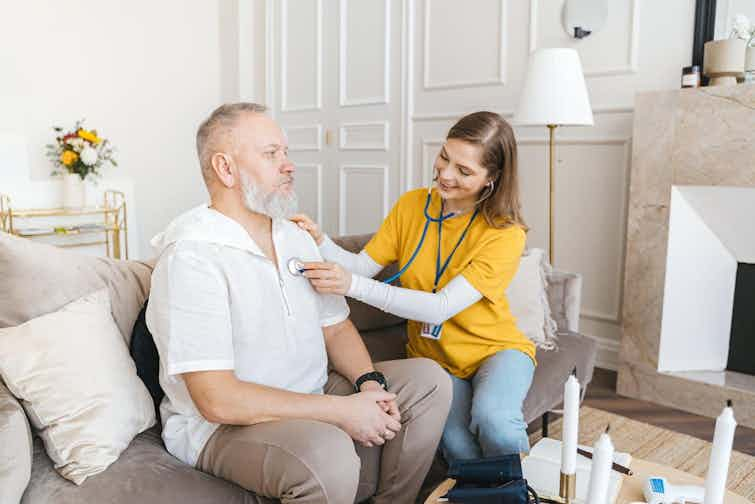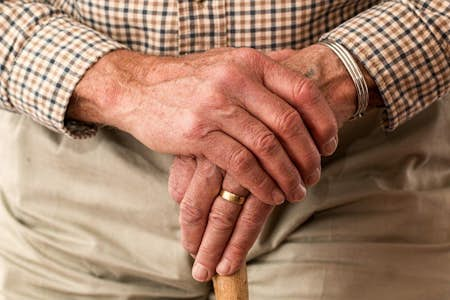Becoming a full-time carer can be stressful, especially when you add finances into the mix. From claiming benefits to understanding your pension credits, there’s a lot to think about.
We want to simplify Carer’s Allowance, helping you navigate the application process. Here’s everything you need to know.
Whether you're looking for a personal alarm for yourself or something to put your mind at rest about a loved one's wellbeing, there's something for all needs in this fantastic range of caregiving and monitoring aids.
What is Carer’s Allowance?
Carer’s Allowance is financial support from the government available if you spend at least 35 hours a week caring for someone. For example, if a loved one is terminally ill or elderly, you may need to provide full-time care for them.
Carer's allowance is available to all caregivers, even if you are not residing with the person you're looking after.
Who is eligible for Carer’s Allowance?
There are some key eligibility criteria for Carer’s Allowance. As well as caring for your loved one for at least 35 hours per week, the person you care for must also claim certain qualifying benefits.
This includes benefits such as:
- The daily living component of Personal Independence Payment (PIP).
- The middle or highest care component of Disability Living Allowance (DLA).
- Constant Attendance Allowance.
- Attendance Allowance.
- Armed Forces Independence Payment.
Carer’s Allowance is available for carers who typically live in England, Scotland and Wales. If you’re in Scotland, you may also be able to access Carer’s Allowance Supplement.
Carer’s Allowance is a means-tested benefit, so you must earn £139 or less per week to qualify. You’ll also need to be 16 or over to claim Carer’s Allowance, and you can’t be in full-time education. If you’re working alongside your caring responsibilities, you can still claim this benefit - as long as you spend at least 35 hours as a carer each week.
How much can I get?
You can currently get £76.75 (2023/24) per week to help with your caring responsibilities, and you can choose to receive your money weekly or every four weeks. You should receive your benefit payments straight into your bank account. If you share your caring responsibilities with anyone else, only one person can claim Carer’s Allowance.
If you receive Carer’s Allowance, you’ll automatically receive Class 1 National Insurance credits, which can help you build up your State Pension or qualify for further government help.
Is Carer’s Allowance taxable?
Carer's Allowance is taxable. However, you’ll only have to pay income tax if you have other sources of taxable income, such as personal pensions or part-time earnings, and if this combined income takes you over the standard Personal Allowance (which stands at £12,570 as of 2023/24). Carer's Allowance on its own is below this threshold.
How do I claim Carer’s Allowance?
Simply head to the GOV.UK website and click “Apply now” to get your Carer’s Allowance application started, or print a claim form from the Department for Work and Pensions (DWP) via the UK government website. If you live in Northern Ireland, you may need to complete an application through NI Direct.
If you don’t have a printer - don’t worry! You can also call the Carer’s Allowance Unit to request a form to apply by post.
What documents do I need?
You’ll need a few documents to support your application for Carer’s Allowance, including:
- Your National Insurance number.
- Your latest payslip if you’re currently working, or a P45 if you’re not working anymore.
- Proof of any expenses, such as your pension contributions.
- Disability Living Allowance reference or National Insurance number for the person you’re caring for.
How will Carer’s Allowance affect my pension payments?
If you currently claim State Pension, you may not be able to claim the full amount of Carer’s Allowance and State Pension at the same time. Generally, you’ll not get Carer’s Allowance if you earn £76.75 a week or more from your State Pension. However, you’ll get Carer’s Allowance to make up the difference if your State Pension is less than £76.75.
Your Pension Credit payments may also increase if you can’t claim Carer’s Allowance because of your State Pension, so either way, you should receive adequate financial support during your time as a carer.
How will Carer’s Allowance affect my other benefits?
As a carer, you may find that your other benefit payments change if you receive Carer’s Allowance. This is because Carer’s Allowance technically counts as income, meaning means-tested benefits like Universal Credit can decrease. However, if you’re eligible for Carer’s Allowance, you may get something called Carer’s Element, an extra amount of Universal Credit. You can find out more about Carer’s Element and Universal Credit here.
If you currently receive Working Tax Credit or Child Tax Credit, contact HMRC to see how Carer’s Allowance will affect these benefits. It’s also important to remember that even if you can’t claim Carer’s Allowance due to your other benefits, you may still have an underlying entitlement to it, giving you access to financial support during your time as a carer.
Claiming Carer’s Allowance may also affect the benefits of the person you care for. They may stop receiving a severe disability premium with their benefits or an extra amount for severe disability with their Pension Credit, for example.
Once you claim for Carer’s Allowance, the person you care for may also stop getting reduced Council Tax, so double-check with their local council before applying.
Can I still claim Carer’s Allowance if I take a break from caring?
If you’re a full-time carer, you may need to take a break for various reasons, but you can still receive Carer’s Allowance during your time away. However, you’ll need to tell the DWP about any changes, particularly if you or the person you care for goes into hospital or residential care for more than 12 weeks or if you stop your caring responsibilities for more than 28 days.
You’ll also need to report any changes in circumstances, such as an income increase, to avoid claiming Carer’s Allowance when you don’t need it.
Are there any other benefits available for carers?
There are a few other benefits available for carers. Let’s take a look at them.
Carer’s Credit
Carer’s Credit can help you avoid gaps in your National Insurance record while you care for someone. You’ll get Carer’s Credit in the form of National Insurance credits if you provide at least 20 hours of care per week for someone.
Personal Independence Payment
Personal Independence Payment (PIP) can financially support the person you’re caring for. This money goes towards various tasks, such as help with eating, dressing or moving around.
You can get PIP alongside Employment and Support Allowance (ESA) or other benefits. Unlike Carer’s Allowance, your income won’t affect your eligibility for PIP.
Carer Premium
You may also be able to claim a Carer Premium, known as a Carer Addition, for those who are State Pension age. This is extra money for carers who claim certain benefits, such as:
- Income-related Employment and Support Allowance.
- Housing Benefit.
- Income Support.
- Income-Based Jobseeker’s Allowance.
- Pension Credit.
- Council Tax Support.
Carer’s Allowance: Tips to navigate the application process
Applying for Carer’s Allowance can be daunting, particularly if this is your first application or you’re busy caring for someone. We’ve put together a few tips to navigate the application process:
- Use a benefits calculator.
- Apply online.
- Get your support documents ready.
- Don’t forget to backdate your claim.
- Reach out for help if you need it.
Let’s explore these in more detail.
1. Use a benefits calculator
Before you apply for Carer’s Allowance, use a benefits calculator to understand your eligibility. This can also save you time on a lengthy application if you don’t qualify for Carer’s Allowance.
A benefits calculator can help you understand if you or the person you care for can claim any other disability benefits or how Carer’s Allowance will affect your benefits entitlement.
2. Apply online
You can apply for Carer’s Allowance via post or online. Filling out a digital claim form is the easiest option, as you can fit your application into your schedule. You can also complete the application from the comfort of your own home.
3. Get your supporting documents ready
By getting your documents ready, you can make the application process as smooth as possible. You should also ensure you have all crucial information to hand, such as the date of birth and address of the person you care for. This can ensure you correctly and quickly send off your claim form.
4. Don’t forget to backdate your claim
If you’ve been caring for someone for the past couple of months, but you’ve not yet claimed Carer’s Allowance, don’t forget to backdate your claim. You can backdate your application by up to three months, so make the most of this policy.
5. Reach out for help if you need it
If you’re struggling with your application, reach out for help. Contact the Carer’s Allowance Unit for information over the phone. Other providers, such as the Carers UK helpline, Citizens Advice or the Carers Trust, can offer support. These resources can advise you on how to best navigate the application process.
Image Credit: Antoni Shkraba at Pexels












